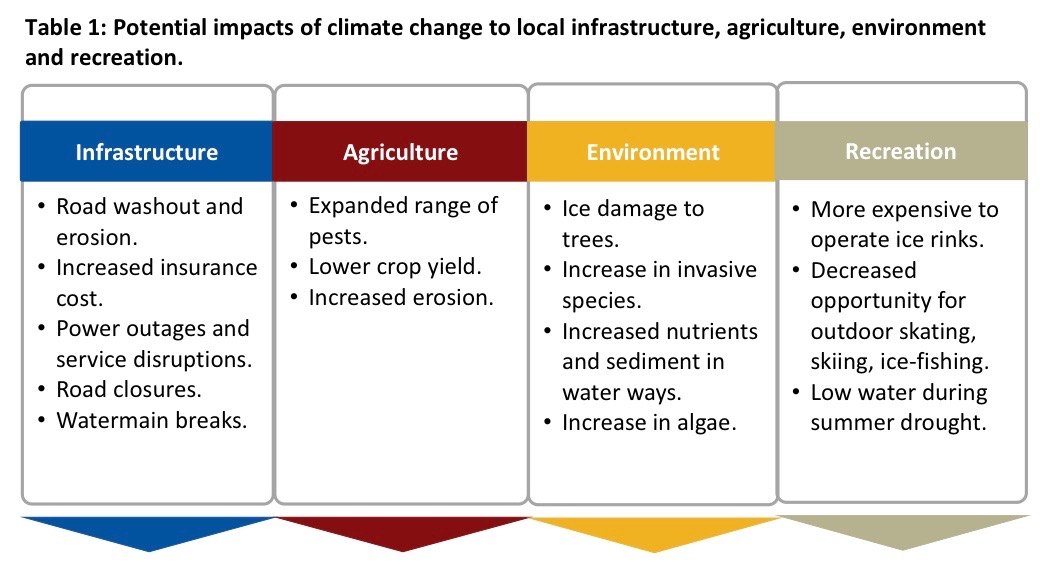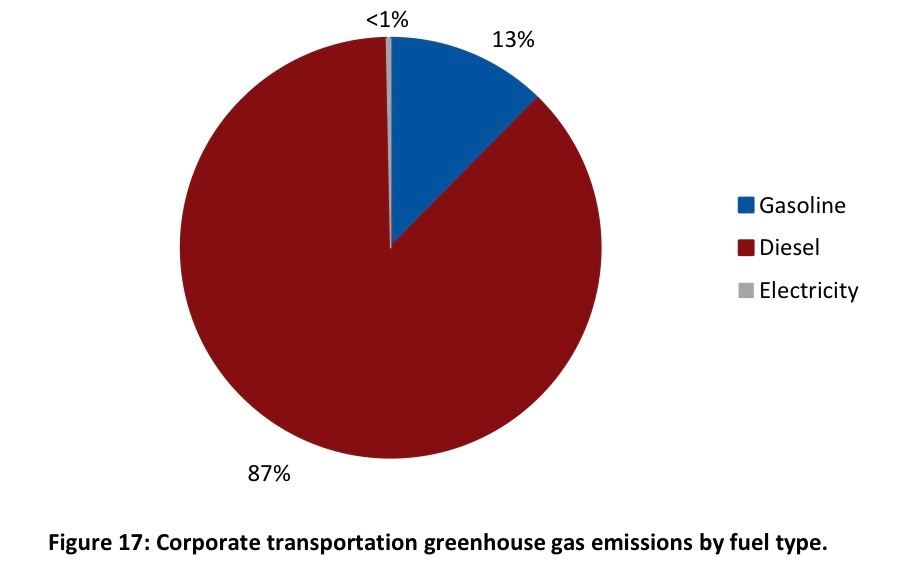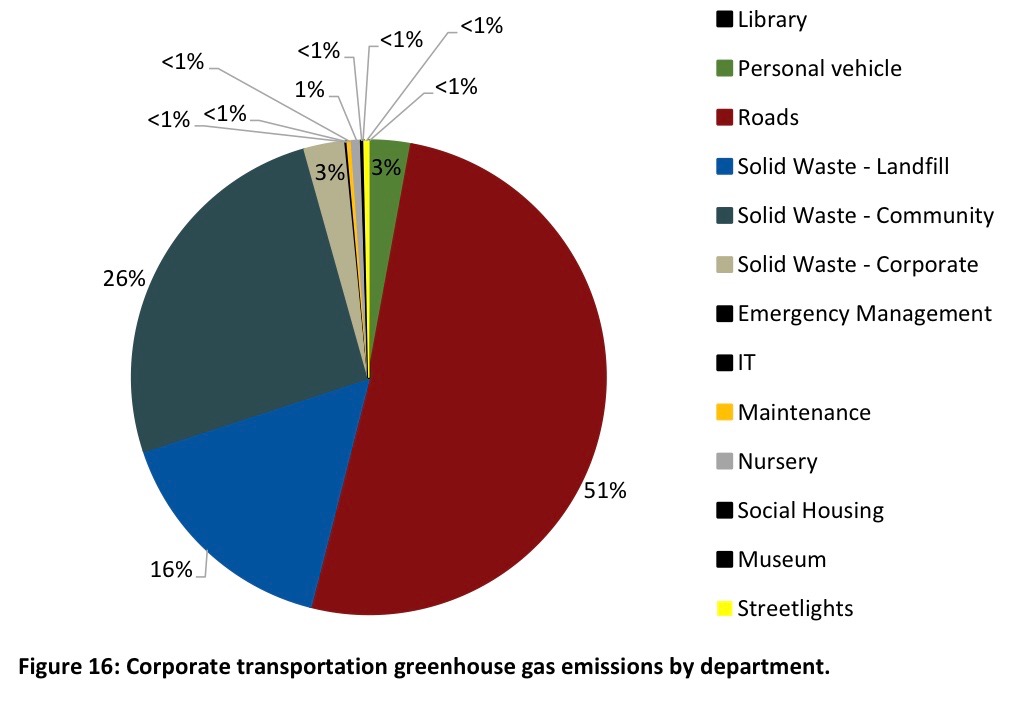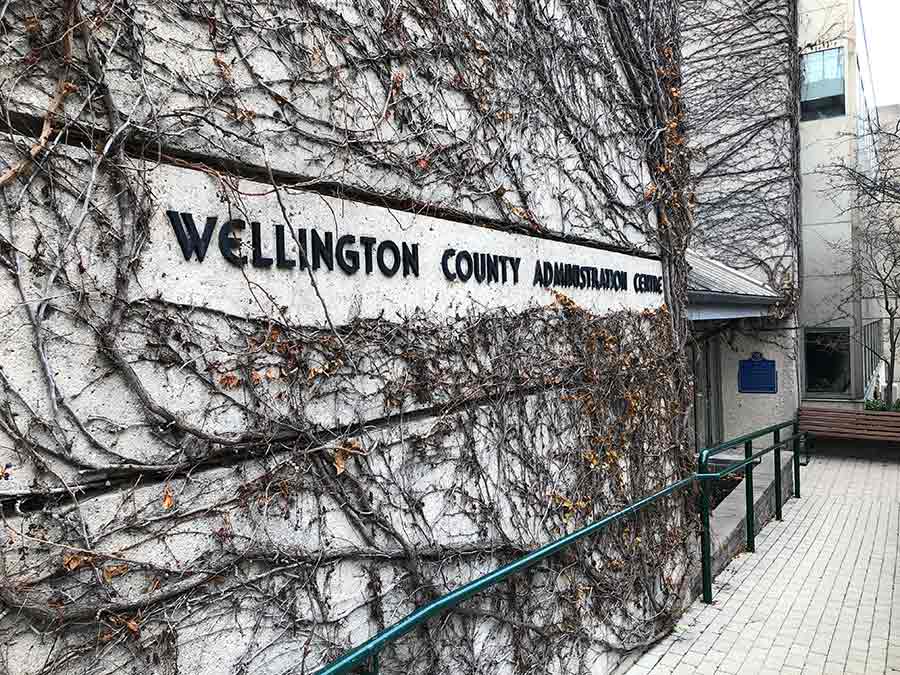WELLINGTON COUNTY – A climate change mitigation plan has been endorsed by Wellington County council and staff have been directed to prepare cost estimates and a work plan to move it forward.
A resolution passed on Feb. 25 directs that the plan, entitled Future Focused, “be endorsed and moved forward for implementation.”
The resolution also directs staff to work with the county’s communications department to finalize Future Focused and prepare the plan for final publication and distribution, as endorsed; and that staff prepare a five-year work plan and cost estimate to guide implementation until 2027.
The plan has been in the works since February of 2019, when the county announced it would use a $125,000 federal grant to fund a climate change coordinator staff position.
At Thursday’s meeting, climate change coordinator Karen Chisholme outlined the 100-plus page plan, which follows the Partners in Climate Protection Milestone framework, comprised of:
- creating a greenhouse gas inventory (corporate and community);
- target setting; and
- recommendations to achieve the set target.
For the 2017 base year, the report estimates the county’s corporate greenhouse gas emissions at 8,300 tonnes of carbon dioxide equivalent (CO2e).
Community greenhouse gas emissions are estimated for 2017 at 1.2 million tonnes of CO2e.

Wellington County council agenda image – Feb. 25, 2021.
County operations considered in the inventory include: buildings, fleet, solid waste and street lighting.
It indicates the greatest contributors to corporate greenhouse gas emissions are natural gas (particularly in social housing) and diesel (from heavy equipment in roads and solid waste).
In the community inventory buildings, transportation, solid waste and agriculture were considered. The report found agriculture is the largest contributor to community greenhouse gas emissions.
“However, agriculture is the only sector able to sequester atmospheric carbon through soil management and natural areas stewardship,” the report states.
“In agriculture, there is also opportunity to use biogenic (biologically created) greenhouse gases as a greener fuel alternative to diesel, gasoline, and natural gas in transportation and heating.
“Similar to the corporate inventory, transportation (gasoline) and space heating (natural gas) are high contributors of greenhouse gas emissions in the community.”
The plan recommends target reductions of 10 per cent and 6% from 2017 emissions by 2030, for corporate and community sectors respectively.
“These targets consider federal and provincial commitments to the Paris Agreement and the federal commitment to net-zero by 2050,” the report explains.
“The targets also consider the ability of proposed recommendations in this report to be implemented within the timeframe of the plan (2030) and are in line with targets recommended by the Partners in Climate Protection.”
Using greenhouse gas inventories as a starting point, the report provides recommendations based on areas of greatest need and potential to reduce emissions, including efforts in the building sector to focus on the reduction of natural gas in heating and industrial processes.
“Natural gas is widely used in the county, is the dominant source of greenhouse gas emissions in the building sector and there are alternative energies and technologies available that produce lower emissions,” the report states.

Wellington County council agenda image – Feb. 25, 2021.
In the short-term, the report recommends transportation efforts emphasize transitioning from gasoline to electric vehicles.
“Actions to reduce the use of diesel will be developed as technologies advance,” the report notes.
“With the county geography and us being really spread out, transit isn’t really an option at this point,” Chisholme told council.
The report states emissions from agriculture will continue to be reduced through adoption of climate-friendly soil and manure management practices.
Many of these actions are supported through the Wellington Rural Water Quality Program, the report notes.
Chisholme pointed out she recently reviewed the plan with members of the Wellington Federation of Agriculture and noted “they were happy with how agriculture was portrayed in the plan.”
The report points out ongoing diversion efforts, through the implementation of the Solid Waste Services Strategy and Our Food Future program, will support reduction of emissions from solid waste.
“Future Focused demonstrates the county’s commitment to lead the community on climate change action by integrating climate change into our decision-making, in order to deliver superior public service for healthy and safe communities and resilient ecosystems,” the report concludes.
Chisholme said many of the recommendations in the plan can be implemented through existing programs “by tweaking or refocusing efforts to include these recommendations.
“Where needed, new programs will be developed in partnership with organizations with shared goals,” she explained.
“Of particular importance will be working with members municipalities to ensure programs address local needs and processes.”
Councillor Steve O’Neil asked if the move to electric vehicles would focus on pickup trucks in the county fleet.
“Yes. I do believe that that may be a good solution for the county … We have very few cars in our fleet, it’s mostly pickup trucks,” said Chisholme, adding viable electric pickups are expected to become available “in the next few years.”
She suggested the county could implement a pilot program to see if such vehicles “can meet some of our needs.”
“I really believe the County of Wellington is moving into the direction of more green energy,” said councillor David Anderson.
“We’ve been moving into that with our new builds. I think we’re moving in the right direction, but we can always do better.”
“I’m tickled pink,” said councillor Don McKay.
“Everybody knows my background as a meteorologist and climatologist and its really nice to see the priority that the county and the municipalities are putting on this whole climate change initiative …
“I can see us, as usual, Wellington County, being in the forefront across Ontario in implementing the climate strategies that we need to do.”

Wellington County council agenda image – Feb. 25, 2021.
Councillor Campbell Cork said, “I think this is a fabulous report and its probably one of the most important documents ever to come before us.
“We’re talking about trying to save the planet.”
Cork added, “Climate mitigation is going to be also one of the most expensive projects ever to come before this council and this is a very long and complicated 100-plus page report with a lot of tremendous information in it and I thank you for it.”
However, Cork suggested council was moving too fast by endorsing the plan and directing the implementation of a work plan.
After some discussion, the original motion to accept the report was amended to indicate the work plan and accompanying cost estimates were “to be approved by council.”
After the amended motion was approved unopposed, Linda Redmond, the county’s manager of planning and environment, thanked Chisholme for her work on preparing the plan, “Despite all the obstacles in front of you.
“This included not only COVID and having to improvise to have engaging staff consultation and public consultation, but also the data collection across the county.”
Redmond noted that while fulfilling her obligations to meet the project deadline, Chisholme also took the initiative to work quietly away on other projects, including:
- bringing together people from county and adjacent regions to work on creating an electric vehicle network;
- encouraging other county personnel to “bring a climate change lens” to their work; and
- improvements to the county’s data collection system.
“These improvements will provide opportunity to have a county-wide inventory and better data flow,” Redmond noted.
“Although this was an immense amount of work, it pales in comparison to what lies ahead as Karen completes her ambitious five-year plan to incorporate and implement all the action items Future Focussed has to offer.”
Warden Kelly Linton said the work done on the plan so far “puts us in a really great spot moving forward.”
However, he noted, county officials will have “a lot of tough decisions to make in the future.”




